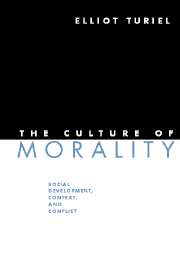Book contents
- Frontmatter
- Contents
- Preface
- 1 Introduction
- 2 Striving for Community
- 3 Discontents Revisited
- 4 Social Judgments and Social Contexts
- 5 The Development of Moral and Social Judgments
- 6 Social Thought and Social Action
- 7 Social Harmony and Social Conflict
- 8 Justice, Heterogeneity, and Cultural Practices
- 9 Social Hierarchy, Subordination, and Human Capabilities
- 10 Perspectives on Cultural Practices: More Than One
- 11 Subversion in Everyday Life
- 12 Conclusion
- References
- Index
4 - Social Judgments and Social Contexts
Published online by Cambridge University Press: 05 June 2012
- Frontmatter
- Contents
- Preface
- 1 Introduction
- 2 Striving for Community
- 3 Discontents Revisited
- 4 Social Judgments and Social Contexts
- 5 The Development of Moral and Social Judgments
- 6 Social Thought and Social Action
- 7 Social Harmony and Social Conflict
- 8 Justice, Heterogeneity, and Cultural Practices
- 9 Social Hierarchy, Subordination, and Human Capabilities
- 10 Perspectives on Cultural Practices: More Than One
- 11 Subversion in Everyday Life
- 12 Conclusion
- References
- Index
Summary
To do as others do is therefore not more fundamental than to deviate from them.
—Solomon Asch, Social Psychology, 1952Since much of the debate about social capital is over whether matters have gotten worse or not, the idea is not unrelated to the often stated view that American society is experiencing moral decay. If social capital has decreased, as Putnam asserts, then it is claimed that the social fabric has deteriorated. If social capital is at the same or higher levels, as Ladd asserts, then it is claimed that the social fabric is vibrant and functioning well. Moreover, the idea of social capital gains importance in these views because it is presumed to be closely linked to trust among members of society. Part of Putnam's analysis was that the decrease in civic and social participation brought with it less trust in others and in society. Putnam offers as evidence of a decrease in trust findings from surveys that asked whether most people can be trusted. In 1960, 58 percent stated that most people could be trusted, whereas in 1993 only 30 percent thought so. Putnam (1995) argues that social trust and civic engagement are strongly correlated, and that they are two facets of social capital.
- Type
- Chapter
- Information
- The Culture of MoralitySocial Development, Context, and Conflict, pp. 67 - 93Publisher: Cambridge University PressPrint publication year: 2002



